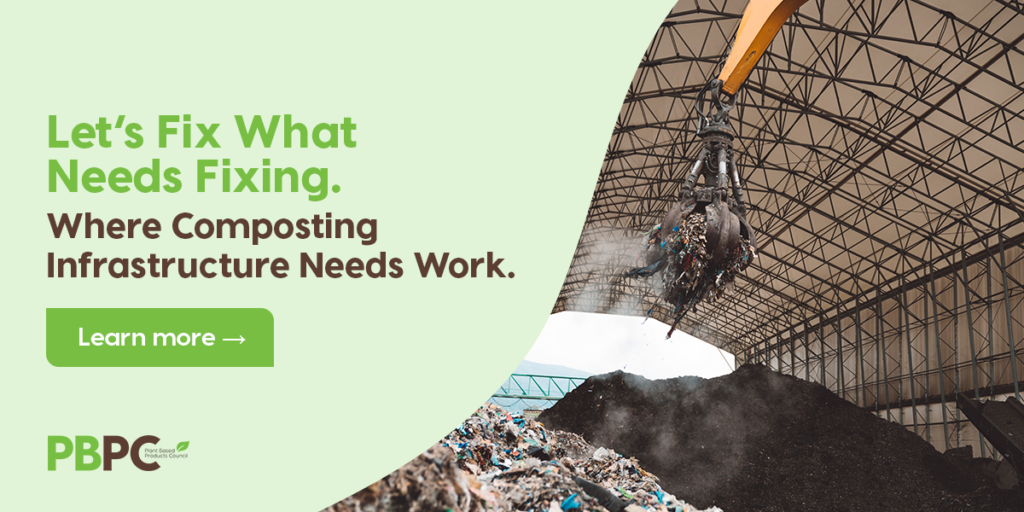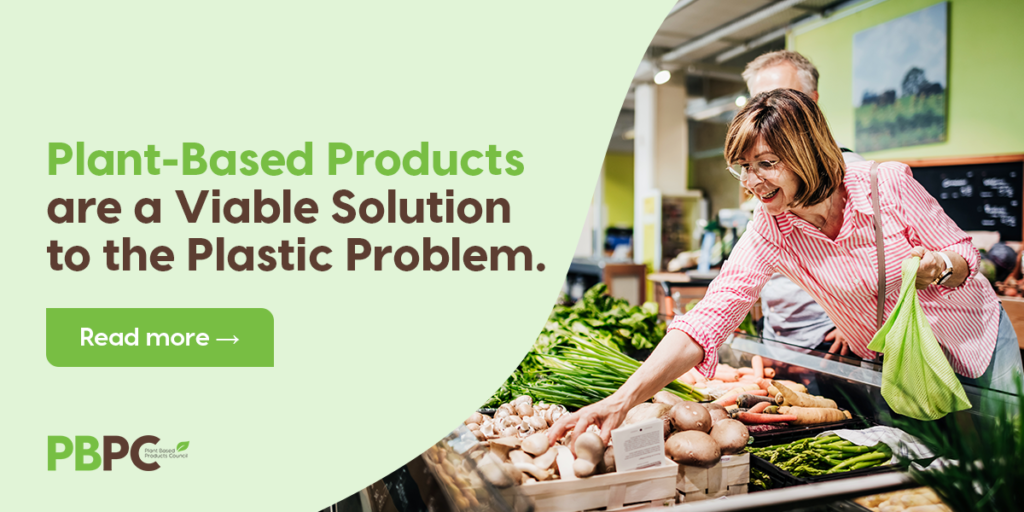Plant Based Products: Story below was taken from the PBPC website: https://pbpc.com/to-cbc-needs-improvement/
To CBC: Infrastructure, Not Plant Based Products, Needs Improvement
A recent CBC Marketplace piece focuses on how Canadian grocery stores are filled with single-use plastic packaging used for a wide variety of products. It concludes that many of these legacy plastic materials are not properly disposed of for recycling, or simply cannot be accepted for recycling at all in Canada. This article highlights how many developed countries like Canada, as well as the U.S., currently lack the proper waste management infrastructure to process certain recyclables.
As a follow-up to their Marketplace piece, the CBC published a deep dive article and a companion video on plant-based plastics. The article covers a lot of important points and salient distinctions but lacks a properly nuanced discussion of end-of-life disposal challenges and the potential environmental benefits plant-based plastics offer when disposed of properly.

In the video, CBC also unfairly accused compostable product manufacturers, like Club Coffee, of “confusing consumers” about their products’ compostability. But what CBC and other media outlets often miss is that there is a wide range of challenges that can lead to facilities not accepting compostables, from contamination with non-compostable plastics to mis-labeled compostable products, and more. PBPC and its members, like Club Coffee, understand these challenges and are working to tackle them. However, those challenges hardly justify claims of “greenwashing” such as those made in CBC’s reporting.
Contrary to CBC’s reporting, Club Coffee’s coffee pods actually meet the internationally-established standard of 100% composability as specified by the Biodegradable Products Institute. Any disposal issue relates to a composting facility’s willingness to accept their product, a fact CBC should have made clear to its audience.
Here’s where else the CBC could improve:
While we agree with CBC’s critique of our infrastructure’s ability to properly process compostable products, it is important to remember that the status quo recycling system has also failed to adequately handle legacy plastics. The world produces over 250 million tons of plastic each year, and just nine percent of it is recycled. On top of this, many “recyclable” products fail to be processed due to contamination by food waste. This reality is often left out in comparisons between plant-based plastics and legacy plastics.
A shift to compostable, plant-based products in tandem with efforts to address the surmountable challenges facing compostable products, including the need for robust investment in composting infrastructure, offers a unique solution to these problems. Not only will this reduce food contamination in the recycling stream by allowing for food packaging to be composted alongside its associated food waste, it will also shift organic matter from landfills into composting streams, thus reducing methane emissions, which are 30 times more potent than CO2. These processes will also convert waste into soil-enriching compost.
We have made it our mission to promote improvements in composting infrastructure while pursuing solutions to the varied challenges associated with ensuring proper disposal. These steps will allow us to realize the full potential of compostable plant-based products. As public demand for plastic alternatives continues to grow, it should be the duty of all stakeholders who want to transition to a circular economy to advocate for these necessary improvements.

Additionally, CBC cites a misleading 2019 University of Plymouth study to question the biodegradability of plant-based products. The study purportedly demonstrated that biodegradable bags do not always effectively degrade, but the CBC omits that the bag used in the research was not a certified biodegradable bag, and was never marketed by the manufacturer as such. Moreover, the compostable bag used to show a failure of composability was not actually composted under industry standard conditions.
There is an extensive body of scientific evidence demonstrating that materials with an official ‘biodegradable’ and ‘compostable’ certification perform as intended, with significant environmental benefit.
Here’s what the CBC gets right:
Now, the good news. The CBC piece appropriately defines the terminology surrounding plant-based products, particularly its explanation of the terms “bio-based,” “bio-degradable” and “compostable.” In doing so, the piece recognizes the potential of compostable plant-based products to substantially reduce the environmental harm caused by legacy plastics.
Additionally, the CBC notes the potential of these products to decrease CO2 emissions. While the article notes that the reduction in emissions varies depending on the bio-based ingredients used, it rightly reports that bioplastics “typically generate fewer carbon emissions over their life cycle compared to traditional plastics.” Plants – the building blocks for these products – absorb carbon as they grow, storing the carbon during their lifecycle, while not adding any new carbon to the atmosphere at their end-of-life, unlike legacy plastics.
The CBC also points to the necessity for improved composting infrastructure. Some compostable plastics, such as Polylactic acid (PLA), used to make drinking cups and cutlery, are not accepted by most municipal composting programs in Canada or other developed countries. That’s why we’ve been extremely vocal about the importance of addressing the acceptance of compostable materials and investing in more robust waste management systems. Such a shift will reduce greenhouse gas emissions and address municipal waste challenges while improving water quality and soil health.
We appreciate it when outlets like CBC strive to inform consumers about plant based products. But we hope that reporters will avoid perpetuating myths, and instead join the effort to tackle the challenges these products face. Looking forward, we hope to see more articles that underscore the benefits of these materials and their potential to reduce our reliance on legacy plastics.

